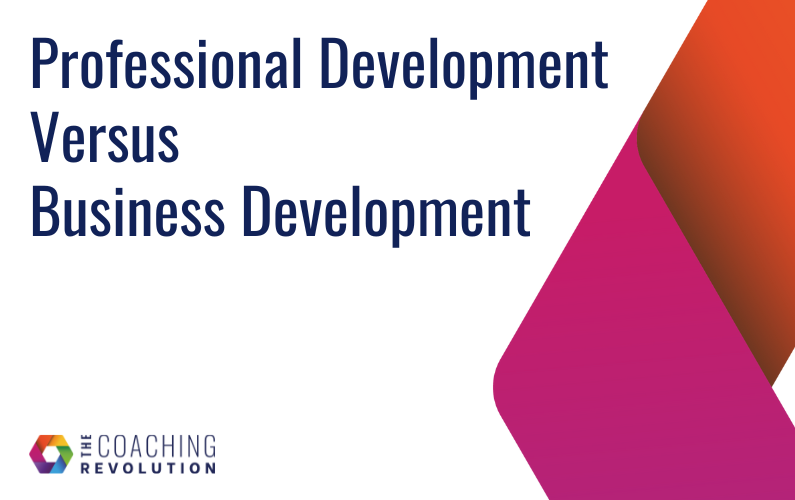Most coaches finish their training believing they understand client acquisition. They don’t realise there’s a gap because they assume client acquisition is intuitive – that casting a wide net is obviously the right approach, and that digital reach (ie the internet!) equals accessible markets.
This fundamental misunderstanding reveals something crucial, and it’s not that coaches conflate professional development with business development. The issue is that they don’t realise business development is a separate discipline entirely.
Let’s look at what each actually entails.
Professional Development in Coaching
Professional development covers everything your coaching qualification taught you: core competencies, ethical frameworks, supervision requirements, accreditation pathways, and coaching methodologies. It’s about becoming proficient at the craft of coaching itself.
This is substantial, valuable learning. Programmes accredited by one of our professional bodies provide rigorous training in listening skills, powerful questioning, goal-setting frameworks, and ethical practice. You emerge qualified to coach, with legitimate credentials and genuine competence in facilitating client transformation.
What professional development doesn’t include, however, is understanding how to acquire private clients or tap into corporate opportunities. It also doesn’t address navigating procurement processes, addressing stakeholder concerns, positioning coaching as a solution to organisational challenges, or pricing packages appropriately.
Business Development Reality
Business development is an entirely different skill set. It encompasses market research, client acquisition strategy, competitive positioning, pricing psychology, sales processes, marketing attribution, and sustainable business model design. Most importantly, it requires understanding that effective marketing means translating what you do into language that potential clients can understand, speaking directly to their specific challenges, and positioning yourself as the obvious choice for their particular needs.
When coaches finish their training, they typically assume client acquisition follows naturally from professional competence. They believe that because they can facilitate transformation, clients will somehow discover this capability and seek them out.
This assumption leads to predictable patterns. Coaches spend their time writing about what coaching can help with – confidence, resilience, work-life balance – and describing the coaching process. They share vulnerable personal stories to “build rapport” and explain their methodology in detail.
This problem is that this isn’t marketing. It’s content creation about coaching theory. Real client acquisition requires understanding specific market segments, their decision-making processes, their language patterns, and their actual business challenges.
Why Intelligence Becomes a Barrier
Highly intelligent coaches often struggle most with accepting that they need business development skills. Having succeeded in previous careers through analytical thinking and professional expertise, they assume these capabilities transfer automatically to entrepreneurship.
This assumption is particularly strong among coaches with procurement or HR experience. They insist they “don’t need to know this stuff” because they’ve been “doing it for years.” Here’s the thing: procuring coaching services is fundamentally different from supplying them. Understanding the buyer’s perspective provides almost no insight into the seller’s requirements.
One former HR coach told me that choosing a coach had been “a few seconds of work” for her. She’d simply go onto LinkedIn and pick someone. She had no concept of the extensive work that the chosen coach had to do to ensure she was the one selected. The procurement process she understood represented the endpoint of someone else’s months or years of positioning, relationship building, and strategic visibility work.
This creates a peculiar form of resistance. These coaches don’t question proven marketing methodology directly – that would be productive. Instead, (and I’ve talked about this before) they claim exemption. They acknowledge expertise exists, then immediately decide their situation is different, they justify why normal rules don’t apply to them, and why they require unique approaches.
The core issue becomes clear when I explain that effective marketing means speaking to people as people, regardless of their professional background. If this happens when a coach is in one of The Coaching Revolution programmes, we can address it. If it happens before they join one, sadly, I can’t counter their beliefs and they often flounder, and then fade away.
The Cost of Confusion
This confusion between professional competence and business capability has measurable consequences. Coaches who assume their coaching skills will naturally attract clients consistently struggle to generate sustainable income.
When months pass without results, they don’t conclude they need different skills. They conclude that marketing doesn’t work. Rather than learning business development principles, they abandon their coaching practice entirely. This contributes significantly to the 82% failure rate in coaching businesses.
Professional development and business development are completely separate disciplines, each requiring distinct knowledge, skills, and mindsets. Excellence in one provides no guarantee of competence in the other. A surgeon with decades of medical expertise still needs to learn business principles to run a successful private practice. A brilliant academic requires different skills to commercialise their research. Professional competence and entrepreneurial capability are different things entirely.
Moving Forward
Recognising this distinction is liberating. It means you’re not failing at coaching when you struggle to find clients – you’re simply missing business development skills that weren’t part of your professional training.
The solution isn’t more coaching qualifications or additional professional development. It’s accepting that building a sustainable coaching business requires learning marketing, sales, positioning, and client acquisition as seriously as you learned coaching competencies.
Success in professional services requires two elements – genuine competence in your craft and systematic capability in business development. Neither is optional, and success in one doesn’t predict success in the other.
Understanding this distinction changes everything. Instead of feeling frustrated that your excellent coaching skills aren’t generating clients, you can focus on building the missing piece: a systematic approach to business development that treats client acquisition as the learnable skill it actually is.
An Opportunity
If you’d like the opportunity for robust conversation about this, why not join my next challenge Nail Your Niche? There’s even an option to upgrade to a VIP version, which gives you 3 x 60-minute group mentoring sessions with me.
Are you ready to challenge your thinking around business development in an interesting and entertaining way? Register for the challenge by clicking here.

Recent Comments